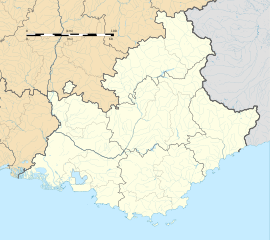Lourmarin (French pronunciation: [luʁmaʁɛ̃]; Occitan: Lormarin) is a commune in the Vaucluse department in the Provence-Alpes-Côte d'Azur region in southeastern France. Its inhabitants are called Lourmarinois.
Lourmarin | |
|---|---|
 View of Lourmarin with vineyards and orchards | |
| Coordinates: 43°46′11″N 5°21′47″E / 43.7696°N 5.363°E | |
| Country | France |
| Region | Provence-Alpes-Côte d'Azur |
| Department | Vaucluse |
| Arrondissement | Apt |
| Canton | Cheval-Blanc |
| Intercommunality | CA Luberon Monts de Vaucluse |
| Government | |
| • Mayor (2020–2026) | Jean-Pierre Pettavino[1] |
Area 1 | 20.18 km2 (7.79 sq mi) |
| Population (2021)[2] | 1,042 |
| • Density | 52/km2 (130/sq mi) |
| Time zone | UTC+01:00 (CET) |
| • Summer (DST) | UTC+02:00 (CEST) |
| INSEE/Postal code | 84068 /84160 |
| Elevation | 169–818 m (554–2,684 ft) (avg. 200 m or 660 ft) |
| 1 French Land Register data, which excludes lakes, ponds, glaciers > 1 km2 (0.386 sq mi or 247 acres) and river estuaries. | |
Geography
editLourmarin is located in the French region of Provence, at the foot of the Luberon Massif where a southern pass debouches over the Luberon from Apt on the northern side of the Luberon. The pass divides the Grand Luberon from the Petit Luberon range, an area rich in Neolithic remains and noted for its dramatic massifs and rockscapes. The Aigues Brun brook comes out of the pass and runs just to the west of the village (Aigue is a Provençal language word for "water", coming from Latin aqua).
History
editLourmarin has been settled for at least a thousand years, and was probably a Neolithic campsite before that.[citation needed]
A fortress was first built at the site in the 12th century, and was rebuilt by Foulques d'Agoult in the 15th century on the foundations of the earlier castle. It was restored in 1920.
In 1545 the town was burned down because its population was predominantly Waldensian protestant.
Its mayor between 2001 and 2017 was Blaise Diagne, grandson of the like-named first Black African deputy and member of a French government.[3]
Sights
editA member of Les Plus Beaux Villages de France (The Most Beautiful Villages of France) Association, Lourmarin nestles in the middle of vineyards, olive groves and almond trees.
Extremely picturesque, the village is a magnet for tourists. Prominent sites are the village itself, the pretty Renaissance castle, the Catholic and Protestant churches and the view from the village of the Proches Bastides, a large fortified farmhouse dating to the Middle Ages. Between the castle and the village stands a chapel built for Protestants. From the village itself it is 20 minute drive down to the Durance River and then about 40 minutes on to Aix-en-Provence.
Miscellaneous
editLourmarin was the birthplace of Philippe de Girard (1775–1845), an engineer and inventor of the linen spinning mill, as well as the name-sake for the town of Żyrardów in Poland (a toponym derived from the polonised spelling of Girard's name). Żyrardów is Lourmarin's twin town.
The writers Henri Bosco (1888–1976) and Albert Camus (1913–1960) both lived there and are buried in the local cemetery.
Another famous writer, British expatriate Peter Mayle lived in Vaugines, near Lourmarin, until his death in 2018. One of his books, A Year in Provence, giving the chronicle of a British expatriate who settled in the village of Ménerbes, was made into a TV series and a film. Another of his books was also made into the film A Good Year (2006) directed by Ridley Scott and starring Russell Crowe, which was filmed nearby in the same region. As a result, in recent decades Luberon and its towns and villages like Lourmarin and Ménerbes, which probably were the lesser known parts of Provence, even in France, became better known in the English-speaking world.
Twin towns – Sister cities
editLourmarin is twinned with:
Gallery
edit-
Albert Camus' tombstone in Lourmarin
-
Pont à la Coquille over Aigue Brun. The bridge is on the territory of the commune of Bonnieux.
-
Lourmarin
-
Lourmarin
See also
editReferences
edit- ^ "Répertoire national des élus: les maires" (in French). data.gouv.fr, Plateforme ouverte des données publiques françaises. 13 September 2022.
- ^ "Populations légales 2021" (in French). The National Institute of Statistics and Economic Studies. 28 December 2023.
- ^ Corinne Deriot, "Entretien avec Blaise Diagne, maire de Lourmarin", Africultures, 5 December 2005



